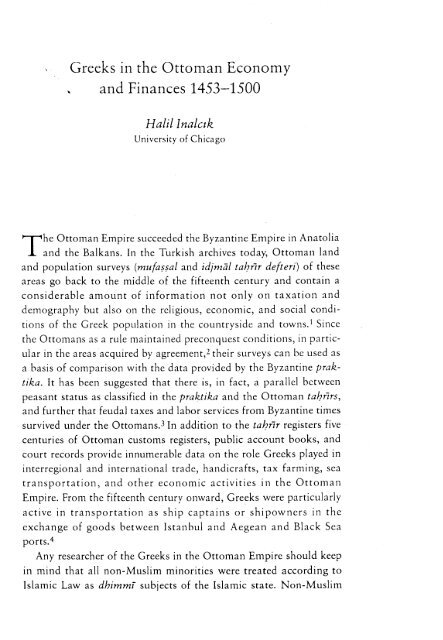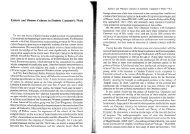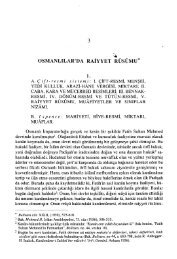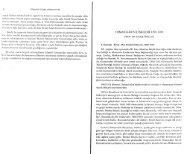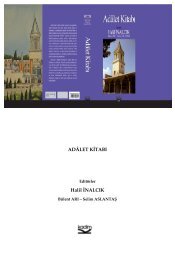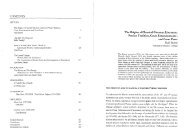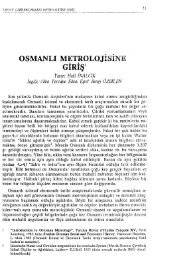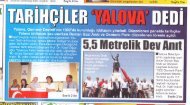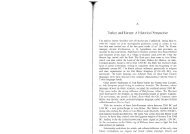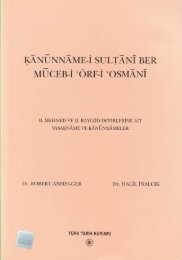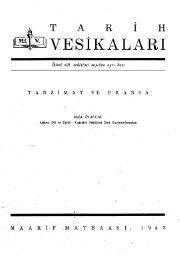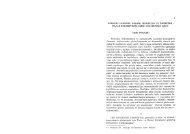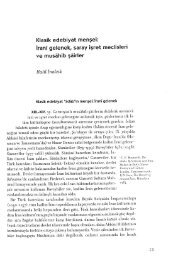Greeks in the Ottoman Economy
Greeks in the Ottoman Economy
Greeks in the Ottoman Economy
- No tags were found...
You also want an ePaper? Increase the reach of your titles
YUMPU automatically turns print PDFs into web optimized ePapers that Google loves.
<strong>Greeks</strong> <strong>in</strong> <strong>the</strong> <strong>Ottoman</strong> <strong>Economy</strong>. and F<strong>in</strong>ances 1453-1500Halil InalakUniversity of ChicagoTh" <strong>Ottoman</strong> Empire succeeded <strong>the</strong> Byzant<strong>in</strong>e Empire <strong>in</strong> AnatoliaI and <strong>the</strong> Balkans. In <strong>the</strong> Turkish archives today, <strong>Ottoman</strong> landand population surveys (mufassal and idjntal tabrlr defteri) of <strong>the</strong>seareas go back to <strong>the</strong> middle of <strong>the</strong> fifteenth century and conta<strong>in</strong> aconsiderable amount of <strong>in</strong>formation not only on taxation anddemography but also on <strong>the</strong> rcligious, economic, and social conditionsof <strong>the</strong> Greek populatior-r <strong>in</strong> <strong>the</strong> countryside and towt-ts.1 S<strong>in</strong>ce<strong>the</strong> <strong>Ottoman</strong>s as a rule ma<strong>in</strong>ta<strong>in</strong>ed preconquest conditions, <strong>in</strong> particular<strong>in</strong> <strong>the</strong> areas acquired by agreement,2 <strong>the</strong>ir surveys can be used asa basis of comparison with <strong>the</strong> data provided by <strong>the</strong> Byzanr<strong>in</strong>e praktika.lt has been suggested that <strong>the</strong>re is, <strong>in</strong> fact, a parallel bctweenpeasant status as classified <strong>in</strong> <strong>the</strong> praktika and <strong>the</strong> <strong>Ottoman</strong> tahrlrs,and fur<strong>the</strong>r that feudal taxes and labor services from Byzant<strong>in</strong>e timessurvived under <strong>the</strong> <strong>Ottoman</strong>s.3 In addition to <strong>the</strong> tahrTr registers fivecenturies of <strong>Ottoman</strong> customs registers, public account books, andcourt records provide <strong>in</strong>numerable data on <strong>the</strong> role <strong>Greeks</strong> played <strong>in</strong><strong>in</strong>terregional and <strong>in</strong>ternational trade, handicrafts, tax farm<strong>in</strong>g, seatransportation, and o<strong>the</strong>r economic activities <strong>in</strong> <strong>the</strong> <strong>Ottoman</strong>Empire. From <strong>the</strong> fifteenth century onward, <strong>Greeks</strong> were particularlyactive <strong>in</strong> transportation as ship captairrs or shipowners <strong>in</strong> <strong>the</strong>cxchange of goods between Istanbul and Aegean and Black Seaports.4Any researcher of <strong>the</strong> <strong>Greeks</strong> <strong>in</strong> <strong>the</strong> <strong>Ottoman</strong> Empire should keep<strong>in</strong> m<strong>in</strong>d that all non-Muslim m<strong>in</strong>orities were treated accord<strong>in</strong>g toIslamic Law as dhimmr subiects of <strong>the</strong> Islamic state. Non-Muslrm
308 Halil lnalakm<strong>in</strong>orities enjoyed <strong>the</strong> same rights as Muslims under <strong>the</strong> protecionof <strong>the</strong> state as far as <strong>the</strong>ir economic activities and property rightswere concerned. Dhimma meant this guarantee and obligation on<strong>the</strong> part of <strong>the</strong> Islamic stare.S For <strong>the</strong> <strong>in</strong>teresrs of <strong>the</strong>ir empire, <strong>the</strong><strong>Ottoman</strong>s applied <strong>the</strong> Islamic prescriptions <strong>in</strong> a particularly liberalway <strong>in</strong> favor of <strong>the</strong>ir dbimnfi subjects. Besides <strong>the</strong> guaranrees ofIslamic Law, <strong>the</strong> protection of commerce and <strong>the</strong> merchants was along tradition with rhe Turco-Mongol srares <strong>in</strong> general. As <strong>the</strong> onlygroup besides <strong>the</strong> rul<strong>in</strong>g class ro accumulate cash capital, <strong>the</strong> merchantshad various functions <strong>in</strong> this pre<strong>in</strong>dustrial society.5 "Lookwith favor on rhe nrerchants <strong>in</strong> <strong>the</strong> land," says an ottoman wisdomLrook of <strong>the</strong> fiftcenth cenrury; "always care for <strong>the</strong>m; let no oneharass <strong>the</strong>m; Iet no one order <strong>the</strong>m about; for through <strong>the</strong>ir tradir-rg<strong>the</strong> land becomes prosperous, and by <strong>the</strong>ir wares chcapness abounds<strong>in</strong> <strong>the</strong> world; through <strong>the</strong>m, <strong>the</strong> excellent fame of <strong>the</strong> Sultan is carriedto surround<strong>in</strong>g lands and by <strong>the</strong>m wealth with<strong>in</strong> <strong>the</strong> land is<strong>in</strong>creased. "Tln <strong>the</strong> ottoman Empire, merchants' activity was not conf<strong>in</strong>ed totrade; with accumulated cash <strong>in</strong> <strong>the</strong>ir possession, rhey also acted asmoney-changers, bankers, and publicans. Many of <strong>the</strong>m comb<strong>in</strong>ed<strong>the</strong>sc various activities.In this paper, usirrg unpublished material from <strong>the</strong> ottomanarchives, I shall focr-rs on <strong>the</strong> Greek publicans <strong>in</strong> <strong>the</strong> period 1453-1500.In order to evaluare changes <strong>in</strong> <strong>the</strong> conditions of <strong>the</strong> Greek mercantileclass under <strong>the</strong> <strong>Ottoman</strong>s, one must first exam<strong>in</strong>e pre-<strong>Ottoman</strong> conditions <strong>in</strong> <strong>the</strong> fourteenth and fifteenth centuries. Theprom<strong>in</strong>cnt feature of Greek mercantile activiry <strong>in</strong> <strong>the</strong> fourteenth century,A. Laiou asscrts, was its dependence on thc Lat<strong>in</strong>s, <strong>in</strong> particularon <strong>the</strong> Genoese, who monopolized <strong>the</strong> grand cornmcrce on <strong>the</strong>exports from and irnporrs ro <strong>the</strong> Aegean and <strong>the</strong> Black Sea, ir-rclud<strong>in</strong>gslaves ar-rd orienral goods.s In <strong>the</strong> pre-orroman period, "<strong>the</strong>Byzant<strong>in</strong>es," LaTou asserts, "rarely ga<strong>in</strong>ed access to <strong>the</strong> ltalian markets."9That <strong>the</strong> Genoese systematically prevented <strong>the</strong> <strong>in</strong>digenoustraders-Jews, Armenians, Tatars, and <strong>Greeks</strong>-by force when necessary,10from participat<strong>in</strong>g <strong>in</strong> <strong>in</strong>ternarional commerce is confirmedby contcmporary documenrs. <strong>Greeks</strong> were prohibited even frombr<strong>in</strong>g<strong>in</strong>g such vital provisions as gra<strong>in</strong> from <strong>the</strong> northcrn Black Sea<strong>Greeks</strong> <strong>in</strong> <strong>the</strong> <strong>Ottoman</strong> <strong>Economy</strong> and F<strong>in</strong>ances 309ports, on which Constant<strong>in</strong>ople's provision<strong>in</strong>g was dependent.The evidence available <strong>in</strong>dicates that <strong>in</strong> this period, Greek traderswere mostly engaged <strong>in</strong> retail trade, funnel<strong>in</strong>g goods imported byItaiiarrs to <strong>the</strong> local market, and <strong>the</strong>ir bus<strong>in</strong>ess generally <strong>in</strong>volvedsmall <strong>in</strong>vestments.llHowever, sporadic references show that <strong>the</strong>re were Greek merchantsengaged <strong>in</strong> distant trade with sizeable amounts of capital.12Large capital accumulated <strong>in</strong> <strong>the</strong> hands of Greek "bus<strong>in</strong>essmen" ofaristocratic orig<strong>in</strong>-a fact attested to <strong>in</strong> <strong>the</strong> Christian and <strong>Ottoman</strong>sources (see belor.l,)--came, at least partly from long-distance trade.Laiou's discovery of a relatively high proportion of merchants or"busitressmen" belong<strong>in</strong>g to <strong>the</strong> Byzant<strong>in</strong>e aristocracyl3ln <strong>the</strong> fourteenthcentury is confirmed by <strong>the</strong> <strong>Ottoman</strong> documentatioll for <strong>the</strong>subsequent <strong>Ottoman</strong> period. Laiou believes that <strong>the</strong> B1'zant<strong>in</strong>e aristocracy,deprived of <strong>the</strong>ir <strong>in</strong>come from land as a result of ttre<strong>Ottoman</strong> conquest, turned of necessity to trade.14 The evidence fromlater <strong>Ottoman</strong> sources shows that <strong>the</strong>se aristocrats with huge cashcapital <strong>in</strong> <strong>the</strong>ir possession, were mostly <strong>in</strong>volved <strong>in</strong> tax farms.However, <strong>the</strong> orig<strong>in</strong>al source of <strong>the</strong>ir wealth might have been itrterregionalor <strong>in</strong>ternatiorral trade, as Laiou suggests.15In <strong>the</strong> period 1353-1402, Laiou calculates, 20 percent of <strong>the</strong> Greekmerchants referred to <strong>in</strong> <strong>the</strong> sources belonged to <strong>the</strong> aristocratic families.16It is of particular <strong>in</strong>terest to f<strong>in</strong>d <strong>the</strong> agents of <strong>the</strong> Palaiologandynasty engaged <strong>in</strong> gra<strong>in</strong> trade between Caffa and Genoa. Later,under <strong>the</strong> <strong>Ottoman</strong>s, members of <strong>the</strong> Palaiologan family will be seenundcrtak<strong>in</strong>g big tax farms. That wealthy members of <strong>the</strong> highByzant<strong>in</strong>e aristocracy had established close economic connectionswith <strong>the</strong> Genoese is corrfirmed by <strong>the</strong> <strong>Ottoman</strong> survey of 1,455.r7'Wealthy Greek aristocrats had residences <strong>in</strong> Pera prior to <strong>the</strong><strong>Ottoman</strong> occupation of <strong>the</strong> city <strong>in</strong> 1453 (see below).Special mention should be made of Nicholas Notaras, fa<strong>the</strong>r ofLucas Notaras, who made "a fortune <strong>in</strong> <strong>the</strong> Genoese public debt."18In <strong>the</strong>ir bus<strong>in</strong>ess activities, <strong>the</strong> family closely cooperated with <strong>the</strong>Lat<strong>in</strong>s, <strong>in</strong>clud<strong>in</strong>g <strong>the</strong> Venetians. Giacamo Badoer's account books'19cover<strong>in</strong>g <strong>the</strong> years 1436-1440, show that Greek merchants were quiteactive <strong>in</strong> Constant<strong>in</strong>ople as retailers <strong>in</strong> <strong>the</strong> trade of imported goods,<strong>in</strong>clud<strong>in</strong>g cloth and spices.
310 Halil InalakPeran <strong>Greeks</strong> must havc also been <strong>in</strong> closc economic relatiorrs with<strong>the</strong> ottomans as early as rhe mid-fourteenrh century. It can be no co<strong>in</strong>cidencethat <strong>the</strong> Byzanti.e cmperor and <strong>the</strong> ottoman sultan hadsimultaneorrsly sigrtcd commercial treatics rvith thc Cenoese <strong>in</strong> 1352,follow<strong>in</strong>g <strong>the</strong> 81'zantit'tcs' abandonmerrr of thc Venetian alliance andrapprochenlent with thc <strong>Ottoman</strong>-Genocsc coalition.2o In thc follow<strong>in</strong>gperiod Pcrans, obviously Grecks among <strong>the</strong>m, who received orientalgoods (<strong>in</strong> particular spices and silk from Bursa), kept close relationswith <strong>the</strong> ottomans.2l After thc surrendcr of pcra <strong>in</strong> 14i3. <strong>the</strong> Greekcapitalist arisrocrats of thc city became ottom an clbimml subjects,cooperat<strong>in</strong>g closcly wirh <strong>the</strong> ottoman government (sce below).The cont<strong>in</strong>u<strong>in</strong>g characteristics of Grcek enterprise are specified bya Greek source dated 14s3,z2tell<strong>in</strong>g us that creeks made big moneythrough tax farms and sea transportatior-r undcr <strong>the</strong> ottomans asbefore under <strong>the</strong> Byz.ant<strong>in</strong>es.sea transportation was <strong>in</strong>deed a pronr<strong>in</strong>cnt sector of thc Greekeconomy ir-r <strong>the</strong> thirteenth and <strong>the</strong> fourteenth cerrruries. This wastrue <strong>in</strong> <strong>the</strong> ports urrdcr <strong>the</strong> Byzant<strong>in</strong>cs as well as <strong>in</strong> those Black seaand Aegean porrs conquered by thc ottomans, arthough beyondthcse two areas, Italian shipp<strong>in</strong>g was always dom<strong>in</strong>ant. A total revcrsalof <strong>the</strong> situatior-r camc with <strong>the</strong> fall of Genoese pera.23Before 1453, <strong>the</strong> o'ly people capable of competi'g <strong>in</strong> long-distancetrade with <strong>the</strong> italians for predom<strong>in</strong>ance <strong>in</strong> <strong>the</strong> overseas trafficwere thc Ragusans. Perhaps an exceprio'al case was a wealthy <strong>Greeks</strong>hipowner of constant<strong>in</strong>ople who lost his four ships with capiraltotal<strong>in</strong>g thirty thousand gold ducats. He was evidently trad<strong>in</strong>g <strong>in</strong>cooperation with <strong>the</strong> Venetians and Jews.zqInterest<strong>in</strong>gly, <strong>the</strong> most importanr porrs i' which Grceks were present,namely constantrnople and pera (both conquered <strong>in</strong> 1453),caffa (conquered <strong>in</strong> 7475), and chilia (conquered <strong>in</strong> 14g4), were <strong>the</strong>same under <strong>the</strong> ottomans as under <strong>the</strong> Byzant<strong>in</strong>es and <strong>the</strong> Genoese.Thessalonike, which <strong>the</strong> ottomans occupied <strong>in</strong> 1430, was anorherimportar-rt Greck cent'er of busirress. Howcver, <strong>the</strong> arithmetic bookcomposed <strong>in</strong> Thessalonike <strong>in</strong> which Greck bankers and traders werementioned should be dated to <strong>the</strong> end, ra<strong>the</strong>r than <strong>the</strong> beg<strong>in</strong>n<strong>in</strong>g, of<strong>the</strong> fifteenrh century.25For <strong>the</strong> fourteenth ce'tury, Laiou, us<strong>in</strong>g Genoese archival materi-Creeks <strong>in</strong> tbe <strong>Ottoman</strong> <strong>Economy</strong> and F<strong>in</strong>ances 311als, aSserts that "<strong>the</strong> <strong>Greeks</strong> formed a large proportion of <strong>the</strong> artisansand rmall shopkeepers of <strong>the</strong> Genoese colonies of Pera, Caffa,and Chios."25 <strong>Ottoman</strong> documents of <strong>the</strong> second half of <strong>the</strong> fifteenthcentury fully support this conclusion for Pera, Caff a, Akkerman(Moncastro) and Chilia (see below).27 On" of <strong>the</strong> pr<strong>in</strong>cipal changes,however, was that under <strong>the</strong> <strong>Ottoman</strong>s Greek sailors began to carry,<strong>in</strong> addition to thcir pre-<strong>Ottoman</strong> traditional traffic <strong>in</strong> foodstuffs,European and oriental goods imported <strong>in</strong>to Istanbul and Galata to<strong>the</strong> Black Sea ports.It should be remembered that <strong>in</strong> 1453 almost <strong>the</strong> entire populationof <strong>the</strong> Byzant<strong>in</strong>e capital had been captured as prisoners of war and<strong>the</strong>ir properties taken as booty. But Galata (Pera), on <strong>the</strong> o<strong>the</strong>r sideof <strong>the</strong> Golden Horn, had surrendercd under a'abdndme, and consequcntly<strong>the</strong> population was spared a similar fate.28 Mehmed <strong>the</strong>Conqueror was most concerned about keep<strong>in</strong>g Galata <strong>in</strong>tact as acommercial center of his new capital, Istanbul, and took measurcs togive assurances and guarantees to have <strong>the</strong>m stay on. Prior to <strong>the</strong>siege of Constant<strong>in</strong>ople, some <strong>Greeks</strong> appear to have taken refuge <strong>in</strong>Galata. The <strong>Ottoman</strong> population and tax survey of 1455 shows thatPera could properly be called a Greek city at <strong>the</strong> time of surrender asfar as its population was concerned.29 Its Greek character becameaccentuated at <strong>the</strong> occupation as a result of <strong>the</strong> Genoese flight from<strong>the</strong> city. Among those who fled, Italians made up about 60 percentand <strong>Greeks</strong> 35 percent. At <strong>the</strong> time of <strong>the</strong> occupation, however, <strong>the</strong>sultan declared that those who returned with<strong>in</strong> three months were torecover thcir properties. Their houses were <strong>the</strong>n sealed and <strong>the</strong> propertiesregistered. Our survey of 1455 shows that <strong>the</strong>re were <strong>in</strong>deedpeople who returned and recovered <strong>the</strong>ir properties.Accord<strong>in</strong>g to <strong>the</strong> Ortoman survcy of 1455, rhe Greek population<strong>in</strong> Galata was conccntrated <strong>in</strong> <strong>the</strong> quarrcrs around <strong>the</strong> Genoese districtat <strong>the</strong> port ^rea.Thc majority of <strong>the</strong> <strong>Greeks</strong> were poor peopleshoemakers,porters, or small traders or craftsmen-but <strong>in</strong> <strong>the</strong>district of Varto Khristo lived a group of wealthy <strong>Greeks</strong>. Twentytwoyears later, <strong>in</strong> <strong>the</strong> survey of 1477, <strong>the</strong> population of Galata brokendown by religion was as follows: of a total population of 1,521.households <strong>Greeks</strong> were still <strong>in</strong> <strong>the</strong> majority, with 592 households;Efrenc or Italiar-r households numbered 332, Armenian 62, and
312 Halil Inalcrk <strong>Greeks</strong> <strong>in</strong> <strong>the</strong> <strong>Ottoman</strong> Econonty and F<strong>in</strong>ances 313Musl<strong>in</strong>r 535, aircady approach<strong>in</strong>g thc <strong>Greeks</strong>. Thus, <strong>in</strong> addition to<strong>the</strong> forccd or voiuntary scttlenrcnt of Grecks <strong>in</strong> Istanbul itself,30Galata rema<strong>in</strong>ed <strong>the</strong> center of Grcek Lrusirress with Crcek bankers,shipowners, and merchants. In 1455, <strong>the</strong> Greek community of Galata<strong>in</strong>cluded membcrs of <strong>the</strong> Greek "aristocratic" families, who were toplay a key role <strong>in</strong> Ottomar-r f<strong>in</strong>ances <strong>in</strong> <strong>the</strong> follow<strong>in</strong>g period.In <strong>the</strong> period immediately after <strong>the</strong> conquest of Constant<strong>in</strong>ople wef<strong>in</strong>d many <strong>Greeks</strong> particularly active <strong>in</strong> tax-farm<strong>in</strong>g. Members of <strong>the</strong>old Byzant<strong>in</strong>e aristocracy, thc Palaiologoi, <strong>the</strong> Kantakouzcrroi, thcChalkokondylai, and <strong>the</strong> Raor,rls were promirrent taxfarmers underMehmed <strong>the</strong> Conqueror and his successors. Dur<strong>in</strong>g <strong>the</strong> fifteenth andsixtcenth centurics, thc customs zone of western Anatolian portswith Istar-rbul as its center made up <strong>the</strong> pr<strong>in</strong>cipal cusroms zone of <strong>the</strong>empire, and it oftcn came under <strong>the</strong> conrrol of Crcek publicans who,with huge amounts o[ capital <strong>in</strong> <strong>the</strong>ir possession, wcre compet<strong>in</strong>gwith Muslim Turks and Jews for this lucrativc undertak<strong>in</strong>g. Here is alist of <strong>the</strong> <strong>Ottoman</strong> rreasury accounts demonstrat<strong>in</strong>g how <strong>the</strong> customsof Istanbul changed hands dur<strong>in</strong>g <strong>the</strong> period of Ocrober 1476to December 1477.311. Ya'kub, new Muslim, Palologoz of Kassandros, Lefteri son ofGalyanos of tcbizond, Arrdriya son of Halkokondil and ManulPalologoz, offered <strong>in</strong> company an <strong>in</strong>crease of 1.5 million akga, onDjumdda 11,25,881. The estimatcd revcnue was 9.5 million akqa onthis date.2. Khodia Satr, Qirish llyds, Shah<strong>in</strong>, freed slavc of Yosuf Simsar(chief broker) and Khodja Bahd'al-DIn, offered an <strong>in</strong>crease of 2 millionon Dh'ul-hid idia 23, 881.3. Palologoz of Istant'rui, Palologoz of Kassandros, Lefteri son ofGalyanos of TieLrizond and Andriya sorr of Halkokondil offered anadditional <strong>in</strong>crease of 933,334 on <strong>the</strong> condition that <strong>the</strong> mukdta'ashould be farmed out to thcm for a period of four years. This bid wason <strong>the</strong> 28th of Muharrem, 882.4. Se1'di Kiiguk of Edirne, Altana Jew, and Nikoroz. Efrendji [anItalian?] offered an additional <strong>in</strong>crease of 1 million on 23 Djumdda I,882.5. The group of Palologoz, Lefteri, and Arrdriya made a new bidon Djumada Il, 20, 882 and <strong>the</strong>n <strong>the</strong> group of Seydi, Alrana, andNikoioz offered 20 million akga altoge<strong>the</strong>r for four years on Radlab4,882. \Thc Istanbul customs zone irrcluded <strong>the</strong> important ports ofIstanbul, Galata, Gallipoli, <strong>the</strong> two Phoceas, Varna, and Mudanya; itcontrollcd western Anatoliau and Black Sea trade with Europe. Thespcctacular <strong>in</strong>crease from 9.5 miilion akga to about 20 million akgaor over four hundred thousand gold ducats offercd by <strong>the</strong> competiltgbidders for <strong>the</strong> customs attest to <strong>the</strong> rapid expansion of this trade aswcll as to <strong>the</strong> f<strong>in</strong>ancial potential of <strong>the</strong> publicans <strong>in</strong>volved.Actually, of <strong>the</strong> various functions that merchant-capitalist fulfilled<strong>in</strong> <strong>Ottoman</strong> society, <strong>the</strong>ir services to <strong>the</strong> public f<strong>in</strong>ances as pr-rblicans('antil or miiltez<strong>in</strong>t) were of vital importance. S<strong>in</strong>ce <strong>the</strong> state dependedon cash revenues flow<strong>in</strong>g regularly <strong>in</strong>to its coffers to pay for a turbulentstand<strong>in</strong>g army and for its militarl,campaigns, nrost of <strong>the</strong>taxcs directly under thc central trcasury's control wcre farmed out topublicans. As a rule, it was <strong>the</strong> merchant-capitalists who had sufficicntanloulrts of ready money to undertake taxfarrns and to providecash to <strong>the</strong> public treasury at three- or six-month <strong>in</strong>tervals, calledkist.Personal or factional connections, as well as sccret deal<strong>in</strong>gs aPpearto irave piayed an important part <strong>in</strong> undertak<strong>in</strong>g big tax farms.Apparently, Grecks or convcrts rvith <strong>in</strong>fluence at <strong>the</strong> sultan's courtfavored <strong>the</strong> Greek bidders. Cornpla<strong>in</strong>ts aga<strong>in</strong>st favoritism for <strong>the</strong>Greck or Jewish publicans dur<strong>in</strong>g <strong>the</strong> Conqueror's reigrt is voiced <strong>in</strong><strong>the</strong> contenrporary sources. Perhaps it is uot iust a co<strong>in</strong>cidence thatmenrbers of Palaiologan farnily obtairred <strong>the</strong> tax farnr of <strong>the</strong> Istanbulcustoms zone <strong>in</strong> <strong>the</strong> 7470s, exactiy when two pashas, Khdss Murddand MesTh, of <strong>the</strong> same family were <strong>the</strong> most <strong>in</strong>flucutial people with<strong>the</strong> sultan.12It is a commonplace that Mehmcd <strong>the</strong> Conqueror showed specialfavor to Grceks <strong>in</strong> his efforts to repopulate and,revive <strong>the</strong> economiclife of his new capital.33 Aside from <strong>the</strong> pro-Lat<strong>in</strong> <strong>Greeks</strong> who left forItaly, many <strong>Greeks</strong> cooperated and were favored by <strong>the</strong> sultan <strong>in</strong>important positions as soldiers, counselors, and f <strong>in</strong>ance experts.There is, as well, documentary cvidence about <strong>the</strong> suitan's <strong>in</strong>terest <strong>in</strong>br<strong>in</strong>g<strong>in</strong>g back <strong>the</strong> <strong>Greeks</strong> rvho had rnigrated to ltaly.Bcsides <strong>the</strong> Palaiologoi and Kar-rtakouzenoi, <strong>the</strong>re were o<strong>the</strong>r Greek
374 Halil lnalaharchonts <strong>in</strong>volved <strong>in</strong> <strong>Ottoman</strong> f<strong>in</strong>ances, <strong>in</strong> some cases probably conr<strong>in</strong>u<strong>in</strong>g<strong>the</strong>ir positior-rs from pre-ottoman rimes. Prior to rhe ortomanperiod, for <strong>in</strong>starrce, Theodore Raoul (Theodorus Rali dc Constant<strong>in</strong>opoli)was <strong>in</strong>volved <strong>in</strong> <strong>the</strong> customs revenues of Istanbul under <strong>the</strong>Byzant<strong>in</strong>e government. In 1455 we f<strong>in</strong>d him <strong>in</strong> Crere.3a But o<strong>the</strong>r membersof <strong>the</strong> Raoul family stayed <strong>in</strong> Istanbul after <strong>the</strong> conquest.Dur<strong>in</strong>g <strong>the</strong> same period, ano<strong>the</strong>r Byzant<strong>in</strong>e aristocratic family wasactive <strong>in</strong> Serbia, farm<strong>in</strong>g out rhe rich silver and gold m<strong>in</strong>es <strong>in</strong> thatprov<strong>in</strong>ce. ln 1474 Yani Kantakouzenos, his bro<strong>the</strong>r Yorgi, NicholaDandjovil, and Lika farmed out <strong>in</strong> partnership rhe silver and goldm<strong>in</strong>es <strong>in</strong> <strong>the</strong> prov<strong>in</strong>ce of vuk, or upper Serbia, for a total sum of 14million akga (or about 290,000 Venetian gold ducats) for six years. In<strong>the</strong> previous year, <strong>the</strong> contractors were Yani Kantakouzenos ofNovobrdo, Yorgi Ivrana, Toma Kantakouzenos (all of Serres), andPalaiologos (of Istanbul) act<strong>in</strong>g as partners.35 Later <strong>in</strong> 1476, <strong>the</strong>ywere replaced by a new group of parrners: Yani and YorgiKantakouzenos, Vuk and Knez Yuvan, and Andriya. In 1477 all of<strong>the</strong>m were executcd because rhei' failed to pay sums under <strong>the</strong> contract.On <strong>the</strong> o<strong>the</strong>r hand, <strong>the</strong> m<strong>in</strong>es of Kratovo <strong>in</strong> <strong>the</strong> prov<strong>in</strong>ce ofKilstendil were farmed our by Yani Palaiologos of Istanbul <strong>in</strong> parrnershipwith Istipa Blasica, Istepan Lesh, and Dimitri son ofKonstant<strong>in</strong> <strong>in</strong> 1473 for a total sum of 1.6 million akga. Accord<strong>in</strong>gto<strong>the</strong> survey of 1455, this Yani Palaiologos lived <strong>in</strong> calata, where heowned large residences.In competition with Muslim or Jewish publicans, <strong>the</strong> Greek bus<strong>in</strong>essmenwere also active as <strong>the</strong> contractors of <strong>the</strong> important monopolicsof salt production and distribution <strong>in</strong> <strong>the</strong> Balkarrs and <strong>the</strong>Aegean and Black Sea costs <strong>in</strong> this period. These monopolies were,as a rule, farmed out with <strong>the</strong> revenues of <strong>the</strong> fisheries <strong>in</strong> <strong>the</strong> neighborhood.Demetrios Palaiologos, <strong>the</strong> last despot of <strong>the</strong> Morea, wasalso <strong>in</strong>volved <strong>in</strong> this bus<strong>in</strong>ess, Accord<strong>in</strong>g ro an ottoman register oftax farms35 "Kir Demetrius Tekfur" possessed <strong>the</strong> poll tax and o<strong>the</strong>rstate revenues of Aenos on <strong>the</strong> basis of timar. But fromJuly 11.,1469,onward, a partnership of three Jewish publicans, Eleazar son ofYakub of salonika, Avraham son of Eleazar of Nicopolis, and Musason of Ismail of Vid<strong>in</strong>, took over rhe job. The total sum of <strong>the</strong> revenuesfrom it was estimated at 555,000 akga for three years. Six years<strong>Greeks</strong> <strong>in</strong> <strong>the</strong> Ottontan <strong>Economy</strong> and F<strong>in</strong>ances 315later,'Yuvan Dhapovik and Knez Yuvan of Novobrdo, evidently Slavs,attempte{ to outbid Yorgi Ivrana and Toma Kantakouzenos withoutsuccess. The reason for <strong>the</strong>ir failure was that <strong>the</strong> central adm<strong>in</strong>istrationhad not approved <strong>the</strong> documents submitted by <strong>the</strong> latter. Greekpublicans conr<strong>in</strong>ued to be <strong>in</strong>volved <strong>in</strong> salt production <strong>in</strong> <strong>the</strong> empire <strong>in</strong><strong>the</strong> follow<strong>in</strong>g century. In 1590, <strong>the</strong> government-appo<strong>in</strong>ted agcnt for<strong>the</strong> import of salt <strong>in</strong>to Istanbul was a Greek by <strong>the</strong> name ofMikhayil, sotr of Komnen. The salt imported <strong>in</strong> one year amountedro 47,274 k-ile, or about 105 tons, transported by <strong>the</strong> ships of Sava,Istefan, Hr,isey<strong>in</strong>, Abdurrahman) and Nika.In 1610 <strong>the</strong> government agent responsible for <strong>the</strong> import of salt <strong>in</strong>toIstanbul and <strong>the</strong> agent <strong>in</strong> <strong>the</strong> Crimean Khanate for salt export wereboth <strong>Greeks</strong> by <strong>the</strong> names of Mikhal and Dimitri. Under <strong>the</strong>ir controi<strong>the</strong> total import amounted to 50,000 kile or about L28 tons with a valueestimated at one million akga. Aga<strong>in</strong>, this salt lvas transported for <strong>the</strong>most part on ships owned by <strong>the</strong> <strong>Greeks</strong> Yorgt, Sava, and Dianali.In <strong>the</strong> <strong>Ottoman</strong> merchant mar<strong>in</strong>e, <strong>Greeks</strong> occupied a prom<strong>in</strong>entplacc. Around 1500, <strong>in</strong> <strong>the</strong> customs registers of Caffa, Akkermarr,and Chilia,37 <strong>Greeks</strong> made up a high percentage of <strong>the</strong> sea capta<strong>in</strong>sand shipowners. Accord<strong>in</strong>g to <strong>the</strong> Caffa customs register of 1.487<strong>the</strong>re were twenty-one Greek shipowners or capta<strong>in</strong>s, all of <strong>the</strong>mactive <strong>in</strong> <strong>the</strong> traffic between Caffa,lstar-rbul, Galata, Sir-rop, Samsun,Inebolu, and Trebizond, as aga<strong>in</strong>st forty-one Muslims atrd fourItalians. The Greek capta<strong>in</strong>s Paskal Rayis, Todoros, Pandazi, andYani of Inebolu were traffick<strong>in</strong>g between <strong>the</strong>se Black Sea ports' carry<strong>in</strong>ggoods belong<strong>in</strong>g to Muslim, Jewish, and Armenian merchants.ln contrast to <strong>the</strong> prom<strong>in</strong>cnt place of <strong>the</strong> Grceks <strong>in</strong> maritime transportation,<strong>the</strong>re were <strong>in</strong> this period orrly a few Greek merchants traffick<strong>in</strong>g<strong>in</strong> <strong>the</strong> Black Sea ports-and most of <strong>the</strong>m were engagcd rntrad<strong>in</strong>g w<strong>in</strong>e and o<strong>the</strong>r natural products. Many of <strong>the</strong> Greek capta<strong>in</strong>s,however, shipped merchandise belong<strong>in</strong>g to <strong>the</strong>mselves, forrvhich <strong>the</strong>y paid customs dues. These goods consisted mostly of w<strong>in</strong>eof Trebizond and of <strong>the</strong> Crimea, caviar and fish of Azak (Azov), ando<strong>the</strong>r natural products of <strong>the</strong> Black Sea region. The fact that <strong>the</strong>Greek capta<strong>in</strong>s were <strong>in</strong>volved <strong>in</strong> <strong>the</strong> trade of bulky goods such as salt,wheat, flour, fruits, fish, and lumber was aPParently due to <strong>the</strong> highpercentage of transportation costs <strong>in</strong> <strong>the</strong> prices of such goods.
316 Halil InalakGre eks <strong>in</strong> <strong>the</strong> <strong>Ottoman</strong> Econonty and F<strong>in</strong>ances3t7Alrcady <strong>in</strong> <strong>the</strong> fifteenth ccnrurx Greek captair-rs must have accumulatedfortunes through rransporr<strong>in</strong>g and trad<strong>in</strong>g such provisions for<strong>the</strong> rapidly grow<strong>in</strong>g Istanbul market. Compared with <strong>the</strong> situation of<strong>the</strong> Palaiologan period, dur<strong>in</strong>g which rhe Black Sea traffic was basicallydepender-rt on <strong>the</strong> Lat<strong>in</strong>s, <strong>the</strong> Grcek merchant mar<strong>in</strong>e under <strong>the</strong>ottomans must have recorded a cousiderabie expansion. ottomanarchives y'ield ample evidence of this development for <strong>the</strong> fiftecnthand sixteenth centurics. Durirrg this period. Galata-Pera became thcpr<strong>in</strong>cipal emporiunr of olive oil, w<strong>in</strong>e, fish, and caviar under <strong>the</strong> controlof <strong>the</strong> Grecks. Ycnikoy on thc Bosphorus was <strong>the</strong> headquarrersof <strong>the</strong> wcalthy Greek shipowncrs and capta<strong>in</strong>s.RepIac<strong>in</strong>g thc Italians <strong>in</strong> rrausportation by sea, <strong>Greeks</strong> were alsoactive <strong>in</strong> ovcrseas trade <strong>in</strong> thc eastern i\4editerranean durirrg thc sameperiod. In a custonrs register dated 1560, for example, rvc f<strong>in</strong>d <strong>Greeks</strong>ea capta<strong>in</strong>s active <strong>in</strong> <strong>the</strong> traffic between Antalya, on <strong>the</strong> one harrd,and <strong>the</strong> Syrian and Egyptian ports, on rhe o<strong>the</strong>r. It should, however,be noted that Musl<strong>in</strong>r captair-rs and shiporvners were <strong>in</strong> a majority <strong>in</strong>this traffic, just as rhey were <strong>in</strong> <strong>the</strong> Black Sea <strong>in</strong> <strong>the</strong> same period.Also, compared with <strong>the</strong> situation around 1453, <strong>the</strong> number ofcreek capta<strong>in</strong>s of vessels and of lvealthy merchaurs showed an<strong>in</strong>crease <strong>in</strong> Venice <strong>in</strong> <strong>the</strong> sixteenth and seventeenth centuries. accord<strong>in</strong>gto <strong>the</strong> archives of thc Grcek color-ry of <strong>the</strong> city.3s Under <strong>Ottoman</strong>protection, Jews, Muslim Turks, Slavs, arrd <strong>Greeks</strong> from <strong>Ottoman</strong>lands forrned flourishirrg merchant conrmunities <strong>in</strong> Ancona andVenice by <strong>the</strong> mid-sixteerlrh ccntury:3e The members of <strong>the</strong> ottoman6lite <strong>in</strong>vesred largc amounrs of capital <strong>in</strong> this overseas trade. Forexample, a letter frorn Suleyman I to <strong>the</strong> Venetian doge <strong>in</strong> 1561 tellsus that rhe k-aprafra, rhe chief officer of <strong>the</strong> seraglio, had made acomntenda contract with two Greek capta<strong>in</strong>s ro go to Venice and dobus<strong>in</strong>ess for him.a0 The agha had entrusred to <strong>the</strong>m two thousandgold pieces and his ship for this commercial venture. This particularcase became <strong>the</strong> subject of correspondence because <strong>the</strong> Greek capta<strong>in</strong>shad cheated <strong>the</strong> kapr-a{a. Creeks also played an ourstand<strong>in</strong>gpart <strong>in</strong> Russian tradc, parricularly <strong>in</strong> furs, as <strong>the</strong> sulran's private merchants,hhAssa tadlir, dur<strong>in</strong>g rhe period.alNOTES1. For ixample, see Evangelia Balta, L'Eubie a la f<strong>in</strong> du XVe siicle,lconontie et population: Les registres de l'annte 1474 (A<strong>the</strong>ns: Society ofEuboean Studies, 1989).2. See H. Inalcrk, "<strong>Ottoman</strong> Methods of Conquest," Sttrdia Islamica 2(1954) : lO4-29; repr<strong>in</strong>ted <strong>in</strong> idem , The Ottonan Entpire: Conquest,Organization and Econonty (London: Variorum Re pr<strong>in</strong>ts, I978), no. 1.3. On praktiha, sce G. Ostrogorsky, Pour l'bistoire de la flodalite by7,7nl<strong>in</strong>e(Brussels, 1954); N. Svoronos, "Recherchcs sur le cadastre byz:rnt<strong>in</strong> ctla fiscalrt6 au XIe et Xlle sidcles: Le cadastre dc Thtbes," Bullet<strong>in</strong> deCorrespondance HelleniEte (1959); for <strong>the</strong> cont<strong>in</strong>uity, see Inalctk, "TheProblem of Relationship bccu.ccn Byzant<strong>in</strong>e and <strong>Ottoman</strong> Taxation," irlAktcn des XI. Internationalen Byzant<strong>in</strong>isten-Kongresses ) 19-58 (Munich,l 960).4. See Inalcrk, Contributions to <strong>the</strong> History of <strong>the</strong> Black Sea Trade(Cambridge, Mass., 1993); also see Inalcrk, "The Question of <strong>the</strong> Clos<strong>in</strong>g of<strong>the</strong> Black Sea under <strong>the</strong> <strong>Ottoman</strong>s," presented at <strong>the</strong> Twelfth Spr<strong>in</strong>gSymposium of Byzant<strong>in</strong>e Studies: "symposium on rhe Black Sea",Birnr<strong>in</strong>gham, March 18-20, 1978, published <strong>in</strong> ArchPont 35 (1979):74-110.5. See "Dh<strong>in</strong>tnta," Encyclopedia of Islant,2d edition (hereafter E12).5. Inalcrk, "Capital Formation <strong>in</strong> <strong>the</strong> <strong>Ottoman</strong> Empire," The Journal ofEconontic History 19, no. 1 (1969):97-140.7. Ibid., 102.8. Angeliki E. Laiou-Thontadakis, "The Greek Merchant of <strong>the</strong> PalaeologanPcriod: A Collective Portrait," Praktiktt 57 (1982): 113.9. Ibid.; cf. M. Balard, La Rontanie G,<strong>in</strong>oise (Geneva, I978), vol.2.10. Laiou-Thomadakis, 102.11.lbid., 100-111.12. Ibid. , 102; for example, Cabasilas, a Greek merchant traffick<strong>in</strong>gwith Egypr around 1349 (ibid.,'108-9).13. Ibid., 108, 110-11.i4. Ibid., 105.f -i. Ibid., 108-9.15. lbid.. 108.
318 Halil lnalak<strong>Greeks</strong> <strong>in</strong> tlte <strong>Ottoman</strong> Econonty and F<strong>in</strong>ances37917. Ibid., 1,08-10.18. N. Oironomides, Hontntes d'affaires grecs et Iat<strong>in</strong>s enconstant<strong>in</strong>ople (XIIIe-xve siicles) (Montreal , 1979),68.722; cf. Laiou-Thomadakis, "Grcek Merchant," 709.19. 1l libro dei conti di Giacanrc Badoer, (Constant<strong>in</strong>opoli, 1436-1440),eds. U. Dor<strong>in</strong>i and T. Bertcld (Venicc 1956); <strong>the</strong> book isexam<strong>in</strong>ed by Laiou-Thomodakis, "Greek Merchant," 109-1 1.20. See Inalcrk, "The Otroman Turks and <strong>the</strong> Crusades, 1329-7522," AHistory of tbe Crttsades, vol. 6, ed. H. Hazard and N. P. Zacour (Madison,1989)21. See Inalcrk, "Orroman Galara," irt Galata, ed. Edhem Eldem(lstanbul, 1990), 55-57 .22.La'iou-Thomadakis, "Greek Merchanr," 111 n.30; rhe source <strong>in</strong> questionis Nicholos lsidoros' correspoltdence.23. See In:rlcrk, "<strong>Ottoman</strong> Girlara," 1744.24. F. Thiriet, Rige.stes des diliberatiotts du Senttt de Venise concernnntla Ronutnle (Paris, 19-58-61), vol.3, no. 3009.25. see Inalcrk, "lnrroducrion to orrom:rn Merrology," Turcica 15 (1983):325; Laiou-Thomadakis, "Greek Merchanr," 110 note 29, agrees wich H.Hunger and K. Vogcl that <strong>the</strong> book was composed <strong>in</strong> <strong>the</strong> early fiftecnth cenrury.25. La'iou-Thontadakis, "Greek N4erchant,' 1 15.27. See Inalcrk, Contributions to <strong>the</strong> History of <strong>the</strong> Black Sea Trade, vol. 1.The Custorns Register of Caffn of 1487-1490 (forrhcom<strong>in</strong>g).28. See Inalcrk, "Galata," 1744.n. EI2, s.v."lstanbul," (lnaic k) 225-27 '34. N. Iorga, No/es et extrAits pour seruir i I'histoire des croisades auXYe siicle, 4:105,n. 34.35. Mukera,ar Regisrer, Bagvek6let Archives, Istanbul' M.M' 7381; onthis branch of <strong>the</strong> Ku"nt^ko,rzenos family <strong>in</strong> Serbia see lorga' Byzance tpresBr-zance: Cont<strong>in</strong>uation de Ia uie byzant<strong>in</strong>e (Bucharesc, 1971), 35; D' M'Nicol , The Byzant<strong>in</strong>e Fantily of KantahoLtzenous (Cantacuzenous)' ca'1100-1450, Dumbarton oaks studies, vol. 11 ('wash<strong>in</strong>gton' D'C', 1968)'36. T. Gokbilg<strong>in</strong> , xv-xvI. astrlarda Edirne ue Pasa LiuLst: vah:flar-Miil kl e r - Muknt aal ar (l st anb u l, 19 52), i ndex'37. See above note 4.3g. D. N. Geanakoplos, Greek- Scholars <strong>in</strong> venice (Cambridge, Mass',1962),55, n.7'3g. See T. Stoianovich, "The conquertng Balkan orthodox Merchatlt,"The Jottrnal of Econontic Histor>i 2O tiqeOt ,234-313; Earle, "TheCommercial Development of Ancon a, 7479_|551,', Econonlic HistoryReuiew 22 (1'959).40. G6kbilg<strong>in</strong>, "Venedik Devlct Argiv<strong>in</strong>deki Vesikalar Ki'illiyatrndanKanuni Sulcan Si.ileyman Devri Belgeleri,', Belgeler2 (1954): |61.41'A.BennigsenandC.L.Quelquejay,..Lesmarchandsdelacourottomane et le Commerce des forlr.rr."., morcouit.s dans la seconde moiti6du XVle sidcie," Cahiers dtt ntonde russe et souiitique 77, no' 3 (1970):363-90.29. Ibrd.30. Inalcrk, "The Policy of Mehmed II roward rhe Greek Popularion oflstanbul and <strong>the</strong> Byzanr<strong>in</strong>e Build<strong>in</strong>gs of <strong>the</strong> Ciry," Duntbarton oaks Pnpers,23124 (1,969-70).31. see Inalcrk, "Norcs on N. Beldiceanu's Translarion of cheKa-nunname , fonds curc ancien 39, Bibliothdquc Nationale, Paris," Derlslant 43,, nos. 1-2 (1967): 139-57.32. See F. Bab<strong>in</strong>ger, "E<strong>in</strong>e Verfrigung des Paliologen Chrss Murdd-pagavon Mitre Regeb 876 h. Dez.lJan. I47Il2,' <strong>in</strong> Docuntenta Islantica Inedita(Berl<strong>in</strong>: Akademie-Verlag, 1952), r97-2r0; EI2, s.v."Mesih Pasha" (lnalcrk),1025-25.
TO E,AAHNIKONStudies <strong>in</strong> Honor of SperosT7 . rfv7n0nxs. Tr.J /JVolume IIByzant<strong>in</strong>osl avrc\ Armeni aca, Isl am ica,<strong>the</strong> Balkans and Modern GreeceEdited byJelisaueta Stanojeuich Allen, Christos P loannidesJobn S. Langdon, Stephen W ReirzertHonorary Editor-<strong>in</strong>- C h i efMihon V AnnstosProject DirectorAndreas I{yprianidesPublished by Aristide D. CaratzasNew Rochelle. New York/94 t


